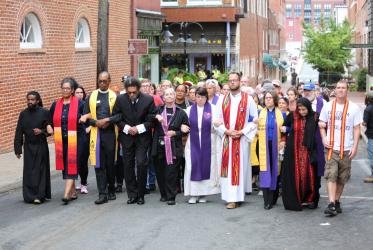As a follow-up to the 2016 WCC Racial Justice Solidarity visit to the USA, the WCC has organised yearly training workshops on how to use United Nations human rights mechanisms to advance racial justice.
Since 2022, the training has been delivered online.
The training is offering an introduction to key terminologies such as racism, racial justice, discrimination, xenophobia, and afrophobia. Participants are trained to use UN human rights mechanisms such as special procedures and treaty bodies, with UN experts from these mechanisms facilitating these sessions. Participants are also invited to make country presentations, an opportunity to learn about situations of racial injustices in other contexts.
Claude Cahn, a human rights officer with the Indigenous Peoples and Minorities Section at the UN Office of the High Commissioner for Human Rights (OHCHR), reflected on the definition of racism versus racial discrimination. With regard to discrimination, he noted, “the law treats the action or the omission” that may be the result of racism.
Creating laws that specifically combat racism is very difficult, Cahn explained. “So you actually have a right to think horrible thoughts about other people,” he said. “What you don’t have a right to do is allow those thoughts to have an influence on reality. The law draws that distinction.”
Participants are also learning about the Committee on the Elimination of Racial Discrimination, or the body of independent experts that monitors implementation of the Convention on the Elimination of All Forms of Racial Discrimination by its State parties.
Ava Saliani, associate Human Rights Officer with the UN Office of the High Commissioner for Human Rights, gave an introduction about special procedures. “The special procedures branch consists of independent human rights experts, meaning that they are not affiliated with any government, any state, or the United Nations,” she said. “They are independent, and they express their ideas, their remarks, and their point of view completely independently.”
The training also covered the Universal Periodic Review, a unique mechanism of the Human Rights Council aimed at reviewing the human rights situation of all UN Member States every five years.
Petero Lalagavivi, from Fiji, spoke of two key issues in the Pacific that relate to racism: self-determination and independence. He also noted that many islands in the Pacific are still under colonial rule, and also addressed the scourge of nuclear testing in the Pacific.
In the Pacific, especially around work in the civil society organizations, there is a key phrase: ‘the Pacific is not free until we are all free,’ and this has been kind of the gathering point in terms of these key issues,” he said.
He also emphasized that racism leads to violence, oppression, and genocide. “The genocide in West Papua has been marked by decades of violence, suppression, and human rights infringements, including an estimated 500,000 civilian deaths.”
“The purpose of these trainings is to make accessible these human rights tools to our participants so they can use them in their work for racial justice. We hope to continue working with them in the future when reporting opportunities arise in the UN framework ”, noted Segma Asfaw, WCC staff, Commission of the Churches on International Affairs.








